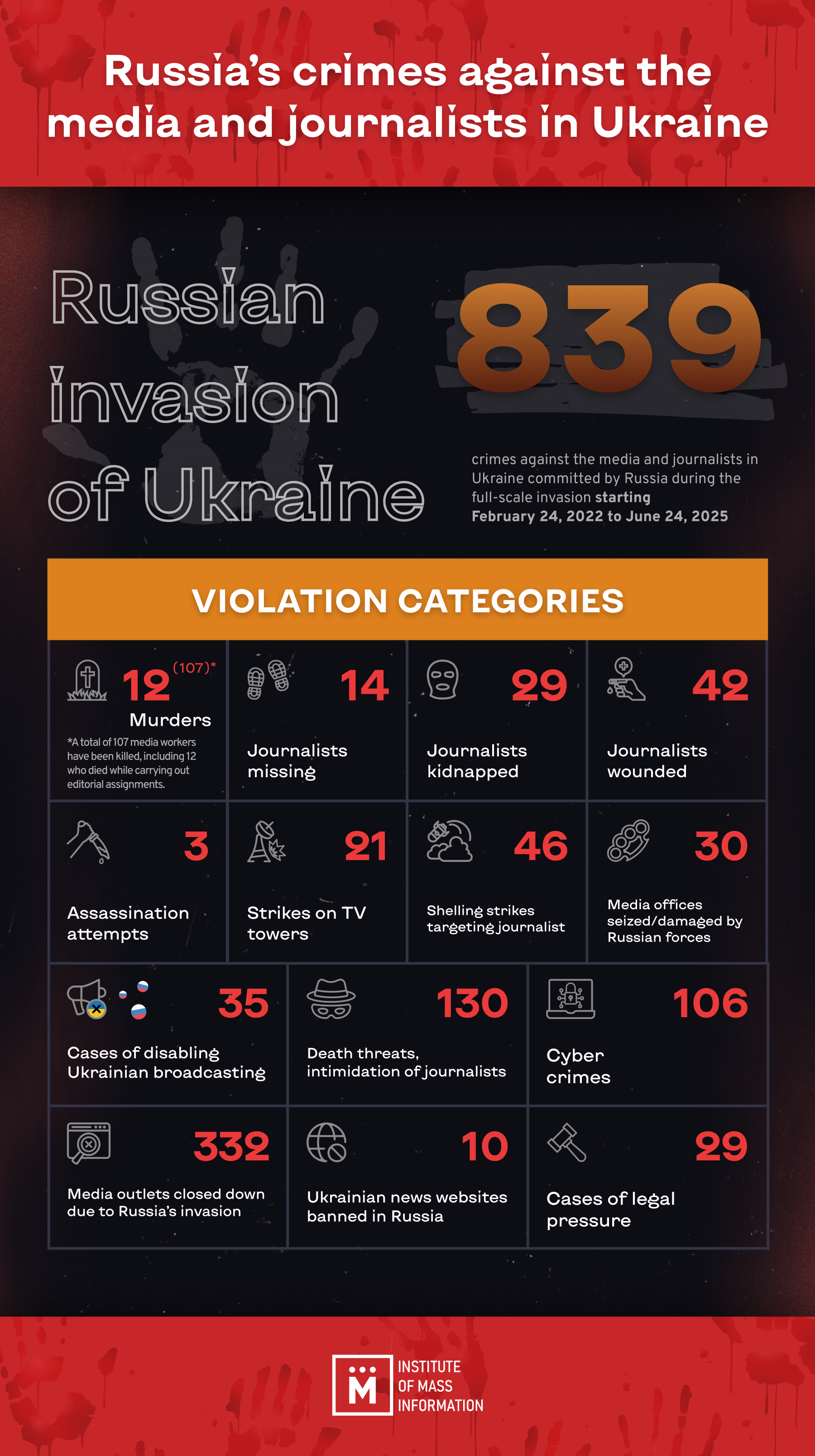In the three years and four months since the start of the full-scale invasion, Russia has committed 839 crimes against journalists and the media in Ukraine, as evidenced by the Monitoring Study of Russia’s Crimes Against Journalists and the Media, which the Institute of Mass Information has been carrying out since the first day of Russia’s invasion of Ukraine.
IMI recorded three crimes against the media and journalists committed by Russia in May—June. These were a shelling strike, death threats to a journalist, and an assassination attempt.
One media professional died in June:
- Vladyslav Voloboyev, drafted journalist with the Kryvyi Rih city newspaper Pulse. Died in a Russian strike on a military training ground on June 1. He was only five weeks into his training at the moment of his death. He worked with Pulse for five years.

Russia’s crimes against the media and journalists in Ukraine
In May, Russian troops targeted Suspilne Donbas filming crew (chief editor Andriy Kramchenkov and reporter Vladyslav Ukolov) with a drone as they were recording an interview in Rodynske village (Donetsk oblast). The media workers were wearing black bulletproof vests and “Press” badges. They were unharmed.
Serhiy Horbatenko, a war reporter with the Radio Liberty project Donbas.Realii, faced violent threats and harassment on pro-Russian Telegram channels in Donetsk oblast following the release of the project’s video commemorating the second anniversary of the Russian occupation of Bakhmut.
The Security Service of Ukraine (SBU) reported thwarting an attempt on the life of media personality Dmytro Gordon by Russia’s FSB, which set a reward of 400 thousand US dollars for the crime. According to the SBU, the mission was entrusted to an undercover agent: a Russian citizen hailing from the North Caucasus who was to create agent groups in Kyiv. The persons of interest stalked Gordon, having disguised their cars as taxis and equipped them with hidden video recorders. “As per the FSB’s plan, the assassin was supposed to attack the target with a firearm and quickly flee the scene, get rid of the weapon, and ‘lay low.’ The resident agent was looking to purchase a motorcycle for this purpose,” the SBU reported.
All members of the group and the resident agent were detained while preparing for the assassination attempt. They were notified of suspicion under Part 1 of Article 258 of the Criminal Code of Ukraine (“Acts of terrorism”). They are in custody, facing up to 10 years in prison with confiscation of property.
Read the full monitoring study here.
The Institute of Mass Information (IMI) is a Ukrainian non-governmental media organization that has been operating since 1996. The IMI defends the rights of journalists, analyzes the media field and covers media-related events, fights propaganda and disinformation and has been providing media outlets with safety gear for trips to the combat zone since the start of the Russo–Ukrainian war in 2014.
The IMI carries out Ukraine’s only freedom of speech monitoring and keeps a list of high quality and sustainable online media outlets, documents Russia’s crimes against the media committed in the course of the war on Ukraine. The IMI has representatives in 20 oblasts of Ukraine and a network of “Mediabaza” hubs to provide journalists with continuous support. The IMI’s partners include Reporters Without Borders and Freedom House; the organization is a member of the International Organization for the Protection of Freedom of Expression (IFEX).
